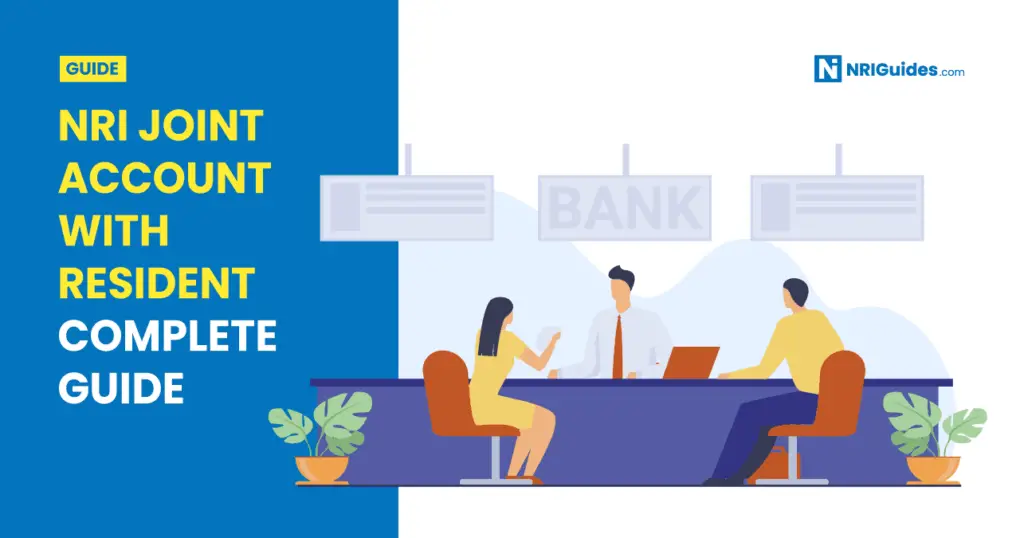The NRI Guides Team regularly reviews this article to ensure the content is up-to-date and accurate. The last editorial review and update were on 25 October 2023.
Opening a joint account is an easy way to manage your finances with another person. By splitting the bills and expenses, you can avoid confusion or conflict over money. It can also be helpful in an emergency since both parties will have access to the funds.
However, this can get tricky when one of the parties is an NRI (Non-Resident Indian) and the other is a Resident Indian.
How can an NRI open a joint account with an Indian resident? What are the documents needed for the NRI Joint Account? This blog post will answer all your questions.
Table of Contents
What is a Joint Account?
A joint account is a financial account owned by two or more people. Joint accounts are common among couples, business partners, and other close relationships.
Benefits of a Joint Account
A joint account has several benefits. For once, it helps to build trust and communication within a relationship. A shared financial goal can also help foster teamwork and cooperation.
Additionally, a joint account can provide convenience and flexibility, especially if one account holder cannot access the funds for any reason.
Finally, a joint account can offer some protection if one of the account holders passes away. In most cases, the remaining account holder will be able to continue using the account without any significant changes.
Condition for NRI Joint Account with Resident
According to the Reserve Bank of India, NRIs/ OCIs can hold a Joint Bank Account with a resident relative on a “Former or Survivor” basis.
Here the relative is defined as per the Companies Act, 2013. These relatives include parents, grandparents, spouses, siblings’ spouses, siblings, children, children’s spouses, grandchildren, and spouses of grandchildren.
Types of NRI Joint Accounts
In addition to a normal joint account with another NRI, there are two types of joint accounts that an NRI can hold with a Resident Indian.
1. Joint Account Between two NRIs
An NRI can open an NRE/NRO account with one or more NRIs. This can be a current account or a fixed deposit account.
An NRI can open a joint NRO account with one or more NRIs or Indian citizens. However, there can be a joint NRE account only with another NRI.
2. NRO Joint Account with Resident Indian
A joint account with Resident Indian, who is a close relative, can also be opened subject to the following conditions:
- The mode of operation permitted is “Former (NRI) or Survivor” only.
- The NRI (PIO / OCI) will be the primary/first account holder in the joint account, and the Resident Indian will be the second applicant.
This account will be treated as an NRO account and can be operated by the NRI only. By default, the Resident holder can manage this account only after the death of the NRI.
The Resident holder can operate this account if he receives a Power of Attorney from the NRI account holder. In this case, the functions are restricted to withdrawing funds for local payments or making payments to the NRI account holder himself through the financial system.
3. Resident Joint Account with NRI
A Resident Indian can add an NRI (who is a close relative) to his resident account subject to the following conditions:
- The mode of operation permitted is “Either or Survivor” only.
- The Resident Indian will be the primary/first account holder in the joint account, and NRI will be the second applicant.
This account will be treated as a resident account and can be operated by both parties. In this case, the Resident holder in India can withdraw the funds without any hassles.
However, money cannot be transferred outside India, nor can the money be given as a gift. Also, the funds cannot be transferred to NRE/NRO accounts.
The NRI holder shall operate such an account only for and on behalf of the Resident for domestic payment and not for creating any beneficial interest for himself.
If the NRI becomes the sole owner of the account (due to the Resident’s death or any other reason), it will be classified as a Non-Resident Ordinary (NRO) Rupee account.
NRI account holders will be responsible for keeping the bank informed of the status of their accounts so that they can be classified as NRO accounts, and all applicable regulations will apply.

Differences Between Joint Accounts
| Joint Account with two NRIs | NRO Joint Account with Resident Indian | Resident Joint Account with NRI | |
|---|---|---|---|
| Mode of Operation | Either or Survivor | Former or Survivor | Either or Survivor |
| Type of account | NRE/NRO Account | NRO Account | Resident Account |
| Who can operate | Either | NRI (Resident Indian may only operate with Power of Attorney) | Either |
| Restrictions | It will be an NRO Account; Normally the Resident cannot operate | Cannot transfer money abroad or to an NRE/NRO account; Domestic payments only | Cannot transfer money abroad or to NRE/NRO account; Domestic payments only |
How to Open NRI Joint Account with Resident Indian
When an NRI wants to open a joint account with a Resident Indian, both parties have to visit an authorized bank branch in India. They can open a joint account by submitting the required documentation and following the simple process.
Documents Required to Open an NRI Joint Account
The following documents are needed to be submitted for opening an NRI Joint Account
- An application form for opening a joint account
For the NRI:
- Valid passport
- Valid visa
- Overseas Address proof (Driving license / Utility bill / Bank statement etc.)
- A passport-size photograph
For the Resident Indian:
- Identity proof (PAN Card / Passport / Voter ID card / Driving License etc.)
- Address proof (Passport / Voter ID card / Driving License / Bank Passbook etc.)
- A passport-size photograph
NOTE: The required documents may vary from bank to bank. Hence, you should check with your chosen bank for more information.
Some banks also allow this to be done online and with fewer documents if you already have another account.
Responsibilities of Both Parties in a Joint Account
Both parties need to be aware of their responsibilities before opening a joint account. Otherwise, they may end up causing financial harm to themselves or the other party involved.
Responsibilities include ensuring that there are enough funds to cover any upcoming payments and keeping an eye on the account balance to make sure it doesn’t get too low. Both parties should also agree on how the account will be used and what kind of transactions are acceptable.
If one party starts making unauthorized purchases or withdrawals, the other party has the right to close the account. Therefore, it is essential for both parties to be aware of their responsibilities and communicate regularly about the account’s status.
By taking these precautions, joint account holders can help avoid misunderstandings and ensure that their account remains in good standing.
How to Close a Joint Account
If you’re closing a joint account, there are a few things you will need to do. First, you will need to notify your bank in writing of your decision and be sure to include the account number and both account holders’ signatures.
Next, you’ll need to close any outstanding rupee drafts associated with the account. You can do this by sending a written request to your bank and the original drafts. Finally, you must close any recurring deposits or standing instructions associated with the account.
Again, you’ll need to notify your bank in writing and include the relevant account information. Once you’ve taken these steps, your joint account will be closed.
Frequently Asked Questions on NRI Joint Accounts
Can an NRI open a joint account with another NRI?
Yes, an NRE or NRO account may be held jointly in the names of two or more NRIs/OCIs.
Can an NRI open a joint account with a Resident?
An NRI can open a Joint Account with a close resident relative on a “Former or Survivor” basis.
Can an NRI open a Resident Savings Account?
NRIs cannot open Resident accounts. After their status changes to NRI, they have to close the Resident accounts.
What types of accounts can NRI open?
NRIs can open NRE, NRO, or FCNR accounts. NRE and NRO accounts can either be Savings or Fixed Deposit accounts. The FCNR is only a term deposit account.
You May Also Like
- Types of NRI Accounts And Their Differences
- NRI Fixed Deposit Types, Benefits and Interest Rates
- Indian Customs Rules For Carrying Cash
Copyright © NRIGuides.com – Unauthorized reproduction of this article in any language is prohibited. The information provided on this website is intended for general guidance and informational purposes only. It should not be considered a substitute for professional advice.

Aneesh, the Founder & Editor of DG Pixels, holds a Master’s Degree in Communication & Journalism, and has two decades of experience living in the Middle East. Since 2014, he and his team have been sharing helpful content on travel, visa rules, and expatriate affairs.

What is valid visa for NRI ?